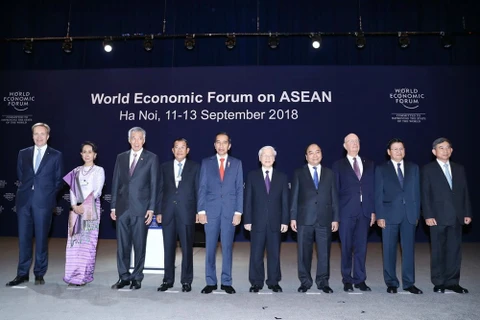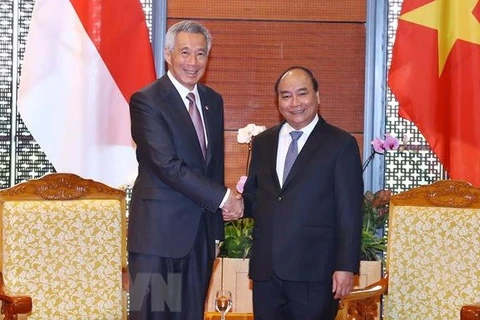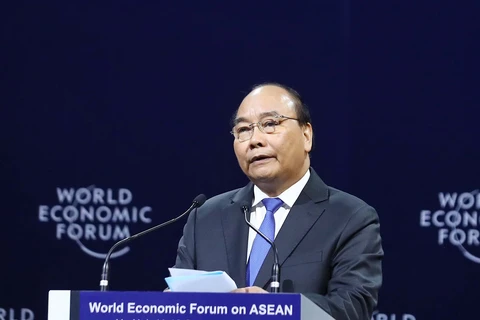Hanoi (VNA) – The theme proposed by Vietnam for the World Economic Forum on ASEAN (WEF-ASEAN) this year, “ASEAN 4.0: Entrepreneurship and the Fourth Industrial Revolution (IR4),” is very relevant and timely, said Vice President of the Asian Development Bank (ADB) Stephen P. Groff.
In an interview granted to the Vietnam News Agency (VNA) on the sidelines of the WEF ASEAN 2018, which is taking place in Hanoi from September 11-13, the ADB official talked about prospects of development for Vietnam and the ASEAN Economic Community in the context of the IR4.
He noted that technological advances are happening at unprecedented speed, and such rapid technological change will have major implications for education, training and skills development in ASEAN countries, including Vietnam, and countries will need to align the supply of skills with the demands of the new economy.
According to Groff, there is a clear need for appropriate public interventions to achieve quality education so new entrants to a transforming labour market are ready for the challenges and opportunities it presents. He said this is particularly important for economies such as Indonesia, Philippines, Thailand and Vietnam, which are likely to face labour market disruptions due to automation and robotization of manufacturing.
“By adopting an entrepreneurial mindset, countries like Vietnam will be able to produce a new generation of confident and proficient workers able to embrace “industry 4.0” technologies and the opportunities they bring,” he said.
For Vietnam, one of the clear challenges will be acquiring world-class IT infrastructure, Groff said, noting that Vietnam’s companies don’t have this at the moment, and government agencies are also not well equipped with modern IT. “4IR requires that existing installations be adapted and even entirely new types of IT infrastructure introduced. Cost is therefore a key challenge for government agencies, large firms, and small and medium-sized enterprises,” he said.
A second challenge facing government agencies, large firms, and SMEs is the lack of skilled workers specializing in IT related jobs, the ADB Vice President said, noting that creative working processes demanded by 4IR, such as strategic planning of research and development, will impose greater needs for new skills to identify, introduce, and implement new and innovative business opportunities.
To overcome those challenges, he suggested that the Government of Vietnam can help to build an enabling environment that makes better use of digital technologies.
“Solid ICT infrastructure is crucial,” he said, adding that policies to support public and private sector investment in telecommunications infrastructure and internet connectivity would create the digital backbone needed for a healthy digital economy.
Second, building human resources with the right skills is a key driver of digital transformation. According to Groff, digital literacy is essential for people to take full advantage of new job opportunities and benefit from services that will become available on digital platforms.
Third, enabling policies and regulatory environments are needed for digital transformation. “Enabling policies can also promote data sharing with privacy protections; protect consumers against cyber-crimes and fraud; prevent illegal activities such as money laundering and terrorist financing; and enhance cybersecurity to prevent cyber-attacks and hacking,” he said.
About prospects of the ASEAN Economic Community, the ADB Vice President said ASEAN has been a model of cooperation and integration, keeping itself open to the rest of the world and well-integrated in regional value chains.
According to him, remaining challenges include the more politically sensitive areas of reform, such as labour policy, competition policy, and intellectual property rights. Looking ahead, the big test for AEC is the ratification and implementation of agreements, given its limited means of enforcing compliance.
Job creation remains a huge challenge with so many young people entering the workforce, as these new workers will need the right skills to prosper in a rapidly-changing labour market, Groff said, adding that further efforts are needed also to address the development divide separating the ASEAN’s newer members from the six original ones.
“We are confident ASEAN can meet these challenges,” the ADB official said. He went on to say that the AEC allows the region to capitalize on diverse resource endowments, comparative advantages of geography, factors of production, and distinct levels of human capital--both in terms of education and demographically. While each member pursues its own national reform agenda, collectively they offer all the ingredients for an AEC that can benefit everyone.
Asked about ADB’s plan to assist the countries in Asia and the Pacific in general and ASEAN countries in particular to overcome the challenges posed by the IR4, Groff said ADB supports countries by introducing digital technologies across a range of sectors, while helping to develop the skills and expertise needed to use these technologies.
“For the poor and underprivileged, we work with governments to strengthen social protection systems. We are also focusing on the application of digital technologies in sectors such as agriculture, where many poor people earn their livelihoods,” he stated.-VNA
VNA

























